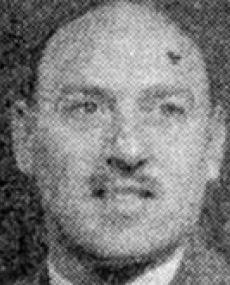
Leonard (Len) Lee-Warden was born in 1913. A linotype operator, he came to South Africa in 1936 from England after serving a five year apprenticeship in London. In South Africa, he worked for the Cape Timesand the Rand Daily Mail.
In 1949, Lee-Warden started his own printing works at the back of a furniture shop in Keerom Street. A year later, he moved his printing press, called Pioneer, to a church hall in Woodstock.
In 1951, Unie Volspers, the printing house that printed The Guardian went bankrupt, and Fred Carneson approached him to take over the printing of the paper. Lee-Warden was the obvious choice, as he was married to Ike Horovitch’s sister, and had previously done printing jobs for the Communist Party prior to its dissolution.
Fred Carneson even offered to lend him money to upgrade his printing equipment in order to print the Guardian, but Lee-Warden refused. He then purchased second hand printing equipment, and moved to Shelley Road in Salt River to begin printing The Guardian. Later due to problems with a partner in the printing business, Lee-Warden did the typesetting and had The Guardian printed at a friend’s printing press in Worcester, and sent via the railways to Cape Town.
The Africans of the Cape Western District elected Lee-Warden to represent them in Parliament in 1954. He then served as Native Representative until 1960. (Native Representatives for the Cape Parliament was established in 1936)
In 1954, he was banned from attending meetings in the Union of South Africa (RSA) and South West Africa (Namibia). At the time, he was the National Vice-President of the Congress of Democrats (CoD). However, the government could not remove him as Lee-Warden had not been listed as a Communist.
In February, Len withdrew his nomination in protest against Ray Simon’s removal, whose name appeared on the Liquidator’s List.
Lee-Warden was also a founding member of the Torch Commando, which held the position of organisational secretary for the Western Cape.
Lee-Warden was arrested for treason on 5 December 1956 and transported with 17 other co-accused, in a military aircraft, from the Cape to Pretoria. The accused were all detained at the Old Fort on Constitution Hill.
On 21 December 1956, he was granted bail of 250 pounds. On the 10 January 1958 charges were withdrawn and he returned to the Cape.
Lee-Warden continued to be outspoken about injustices in the country, which included the story of a policeman, Visser, who was found guilty of the murder of Solly Jooma, but was seen out in public after his conviction.
When Lee-Warden protested against this injustice, but the photograph of Visser and the accompanying story in New Age were dismissed as “communist propaganda” by C.R Swart. Subsequently various people confirmed that the person in the photograph was indeed Visser.
Lee-Warden did not give up however, and doggedly raised this issue in Parliament. Swart was forced to back down and investigate the matter, to which he replied that Visser had been released from a psychiatric hospital by mistake. However, by 1963, Visser was seen back on the streets of Johannesburg.
Len Lee-Warden passed away in 1998.